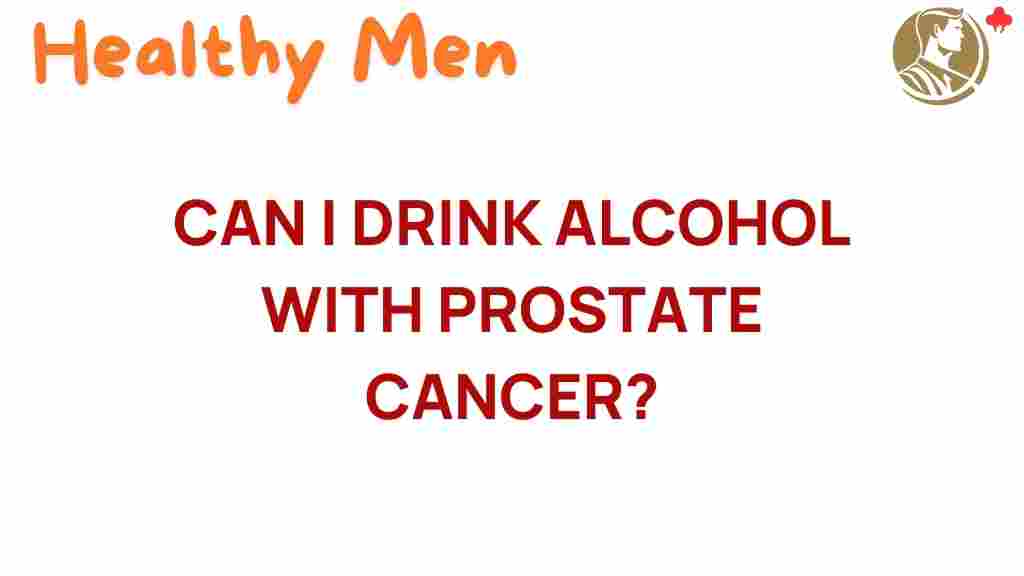Alcohol and Prostate Cancer: A Delicate Balance Uncovered
Prostate cancer is one of the most common types of cancer among men, and understanding its relationship with lifestyle factors, particularly alcohol consumption, is crucial for effective prevention and management. As research continues to evolve, many are left wondering: what is the delicate balance between alcohol and prostate cancer? This article explores the complexities of alcohol intake, its potential risks, and its implications on prostate cancer health, treatment, and recovery.
The Link Between Alcohol and Prostate Cancer
Research regarding alcohol and prostate cancer has produced mixed results, with some studies indicating a potential link between high alcohol consumption and an increased risk of developing prostate cancer, while others suggest that moderate consumption may not have significant effects. Understanding this relationship is essential for men seeking to make informed lifestyle choices.
Understanding Alcohol and Its Effects on Health
Alcohol is a widely consumed substance that can have various effects on health. It is important to differentiate between moderate and excessive alcohol consumption:
- Moderate Alcohol Consumption: Generally defined as up to one drink per day for women and up to two drinks per day for men.
- Excessive Alcohol Consumption: This includes binge drinking and heavy drinking, which can lead to a range of health issues, including liver disease, cardiovascular problems, and potentially increased cancer risk.
When it comes to prostate cancer, the impact of alcohol can be influenced by multiple factors, including:
- Genetics
- Diet
- Overall lifestyle
- Age
Research Findings on Alcohol and Prostate Cancer Risks
Numerous studies have investigated the connection between alcohol and prostate cancer. Here are some key findings:
- A study published in the *Journal of Clinical Oncology* found that heavy alcohol consumption may increase the risk of aggressive prostate cancer.
- Another research project indicated that men who consume more than 1-2 alcoholic drinks daily have a higher likelihood of developing prostate cancer compared to those who abstain or consume alcohol in moderation.
- Conversely, some studies suggest that moderate alcohol consumption, particularly red wine, may have protective effects due to antioxidants.
While the evidence is not conclusive, the potential risks associated with excessive alcohol consumption cannot be overlooked, especially for those with a family history of prostate cancer.
Lifestyle Modifications for Prostate Cancer Prevention
Making informed lifestyle choices can significantly impact prostate cancer risk. Here are some recommendations:
- Limit Alcohol Intake: If you choose to drink, do so in moderation. This can help mitigate potential risks associated with prostate cancer.
- Maintain a Healthy Diet: Incorporate fruits, vegetables, whole grains, and lean proteins. Foods rich in antioxidants may help protect against cancer.
- Exercise Regularly: Physical activity can lower the risk of many diseases, including cancer. Aim for at least 150 minutes of moderate exercise each week.
- Regular Screenings: Discuss prostate cancer screenings with your healthcare provider, especially if you are at higher risk.
Treatment Options for Prostate Cancer
If diagnosed with prostate cancer, treatment options may vary based on the stage and aggressiveness of the disease. Common treatments include:
- Surgery: Removal of the prostate gland (prostatectomy) may be necessary for localized cancer.
- Radiation Therapy: This can be used to target cancer cells in the prostate.
- Hormone Therapy: Hormonal treatments can help control the growth of cancer cells.
- Chemotherapy: This may be used for advanced stages of prostate cancer.
It is crucial for patients to discuss their treatment options thoroughly with their healthcare team, considering how lifestyle factors such as alcohol consumption may affect recovery.
Recovery and Lifestyle Post-Treatment
After treatment, recovery is a critical phase that involves monitoring and lifestyle adjustments. Here are some tips for maintaining health post-treatment:
- Follow-Up Care: Regular check-ups are vital to monitor for any recurrence of cancer.
- Healthy Eating: Continue a balanced diet to strengthen the immune system and support overall health.
- Stay Active: Incorporate physical activity into your daily routine to promote recovery and reduce fatigue.
- Limit Alcohol: If you previously consumed alcohol, consider reducing or eliminating it from your lifestyle, especially during recovery.
Troubleshooting: What to Do If You’re Concerned About Alcohol Consumption
If you are concerned about your alcohol consumption in relation to prostate cancer or overall health, consider these steps:
- Assess Your Drinking Habits: Keep a diary of your alcohol intake to understand your consumption patterns.
- Consult a Healthcare Professional: Speak with a doctor or nutritionist about your concerns and seek personalized advice.
- Consider Support Groups: If you find it challenging to reduce alcohol intake, support groups may provide encouragement and strategies.
Conclusion: Finding the Right Balance
Understanding the relationship between alcohol and prostate cancer is essential for men looking to maintain their health and reduce their risks. While moderate alcohol consumption may not significantly impact prostate cancer risk for some, excessive drinking poses potential dangers. Prioritizing a healthy lifestyle, including diet and exercise, combined with responsible alcohol consumption, can contribute to long-term health and well-being.
For further reading on prostate cancer and lifestyle factors, visit here.
Remember, every individual’s situation is unique, and it’s crucial to engage with healthcare professionals to develop a personalized plan that addresses your health needs and concerns regarding alcohol and prostate cancer.
This article is in the category Conditions and created by healthymen Team
